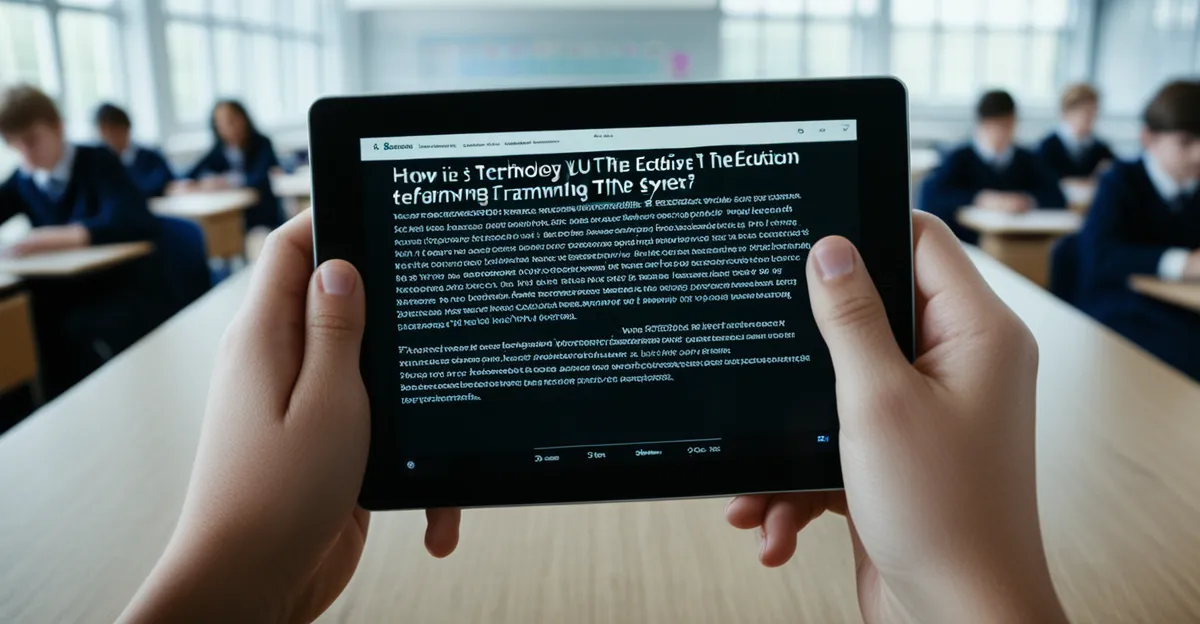The Impact of Technology on Teaching and Learning Methods
Digital transformation in UK schools is reshaping traditional teaching through widespread EdTech adoption. Classrooms equipped with interactive whiteboards and tablets are moving beyond passive lectures to dynamic, participatory learning. The integration of e-learning platforms enables educators to design lessons that are both accessible and engaging, fostering collaborative environments where students contribute actively.
E-learning adoption brings real-time communication tools and multimedia resources, facilitating diverse instructional strategies tailored to learners’ needs. Digital collaboration tools, such as shared documents and discussion forums, promote group work and critical thinking skills, essential in modern education settings.
Also to see : How Has UK Technology Innovation Changed the Landscape of Business?
One standout example is a London secondary school employing a blended learning model. Here, face-to-face sessions complement online modules, resulting in improved attendance and higher exam performance. Such case studies highlight that when EdTech is thoughtfully integrated, it not only enhances comprehension but also prepares students for digital fluency.
By embracing interactive classrooms, UK schools demonstrate how technology empowers educators to innovate. This shift supports individualized support and promotes engagement, indicating that EdTech is pivotal to evolving teaching and learning methods today.
In parallel : How Is UK Technology Revolutionizing Renewable Energy Solutions?
Enhancing Student Engagement and Personalised Learning
Personalised education is gaining momentum in UK schools through the strategic use of AI in learning. Artificial intelligence facilitates adaptive learning pathways that respond to individual student needs, pacing, and comprehension levels. For instance, AI-driven platforms analyse students’ interactions and performance to adjust content difficulty, enabling a tailored learning experience that supports diverse abilities effectively.
Digital classrooms leverage data-driven insights to customise lesson plans and monitor student progress continuously. Teachers receive actionable feedback that highlights strengths and areas requiring support, allowing for interventions before students fall behind. This precise monitoring supports differentiated instruction, enhancing outcomes.
Gamification and interactive content are powerful tools within personalised education, as they enrich digital classrooms with engaging tasks that boost motivation and participation. Elements like quizzes with instant feedback, badges, and challenges make learning enjoyable, fostering sustained attention.
In summary, the integration of AI and interactive content transforms traditional instruction into a more responsive, student-centred approach. This evolution not only celebrates individual learning styles but also promotes active engagement, setting a new standard in personalised education within UK digital classrooms.
Transforming Assessment and Feedback Processes
Digital assessment in UK schools is revolutionising how educators evaluate student learning. Online testing platforms enable efficient, scalable assessments that reduce manual grading time and provide immediate results. Automated grading systems use algorithms to mark objective responses instantly, allowing teachers to focus on analysing complex answers and personalised feedback.
Real-time feedback delivered through learning management systems is pivotal for supporting students’ progress. When students receive prompt insights into their performance, they can identify and address gaps quickly. This immediate feedback loop fosters a growth mindset, encouraging continuous improvement rather than waiting weeks for traditional report cards.
Educational analytics plays a critical role by aggregating performance data across assessments to highlight trends and inform tailored instruction. Teachers can pinpoint concepts that many struggle with and adjust lesson plans accordingly. For instance, analytics may reveal that a cohort excels in certain topics but underperforms in problem-solving exercises, prompting targeted interventions.
Overall, digital assessment tools enhance accuracy, efficiency, and responsiveness in evaluating students. This shift supports a more dynamic and personalised learning experience, aligning assessment practices with the digital transformation occurring across UK classrooms.
Expanding Curriculum and Resource Accessibility
Accessibility to quality education in UK schools is being greatly enhanced by the growth of open educational resources (OER) and the expansion of remote learning options. These digital curriculum UK initiatives provide students and teachers with a vast array of free or low-cost materials that complement traditional textbooks. By integrating OER, schools ensure that rich content is available regardless of location, making education more equitable.
Remote learning platforms have evolved to support virtual classrooms, enabling students in rural or underserved areas to participate fully alongside their peers. Such platforms often include interactive tools and multimedia content, which maintain engagement during distance learning. For example, a student in a remote region can access the same advanced science module as a student in London.
Government programmes also play a crucial role by funding infrastructure improvements and training to promote digital inclusivity. These efforts focus on bridging gaps created by socioeconomic disparities, ensuring every learner benefits from technological advances.
In summary, expanding digital curriculum UK through open educational resources and remote learning not only widens access but empowers educators with diverse tools to support varied learning needs across the country.
Addressing Challenges in the Digitisation of Education
Navigating the digital divide UK remains a significant barrier in EdTech adoption. Many students lack reliable access to devices or high-speed internet, which limits their ability to participate fully in remote learning or interactive classrooms. This inequality often correlates with socioeconomic factors, exacerbating educational disparities.
Educators face challenges too, as EdTech barriers include insufficient training and reluctance to change established teaching routines. Without proper professional development, teachers may struggle to integrate new digital tools effectively, reducing the potential benefits of technology-enhanced instruction.
Moreover, online learning disadvantages extend to concerns about engagement and screen fatigue, which can hinder learning outcomes. Cybersecurity and data privacy represent critical issues; schools must safeguard sensitive information amidst increasing digital interactions. Protecting students’ data while maintaining open, collaborative digital environments is a delicate balance that requires constant vigilance and updated protocols.
Addressing these challenges calls for targeted policies that allocate resources to infrastructure, comprehensive teacher training programs, and robust cybersecurity measures. Bridging the digital divide UK and overcoming EdTech barriers are essential steps to ensure equitable and secure access to quality education in a digital era.
The Impact of Technology on Teaching and Learning Methods
EdTech in UK schools has fundamentally shifted teaching from rote memorisation to active, interactive classrooms where student participation is integral. Traditional chalk-and-talk approaches are rapidly giving way to digital lessons enriched by multimedia resources and collaborative platforms. The widespread e-learning adoption empowers educators to curate dynamic content tailored to diverse learning styles, thereby converting passive listening into engaging exploration.
Integration of digital tools such as virtual whiteboards, discussion forums, and shared documents fosters peer collaboration and real-time feedback, enhancing comprehension and critical thinking. For example, a Midlands secondary school successfully implemented an e-learning platform that increased student engagement by blending synchronous and asynchronous activities, leading to marked improvement in exam scores.
Moreover, e-learning adoption enables flexible pacing, allowing students to revisit challenging concepts, while teachers adjust instruction based on detailed analytics. These advances indicate that embedding EdTech in UK schools not only modernises pedagogical methods but also cultivates essential 21st-century skills like digital literacy and teamwork, ensuring learners are well-prepared for future academic and professional environments.




